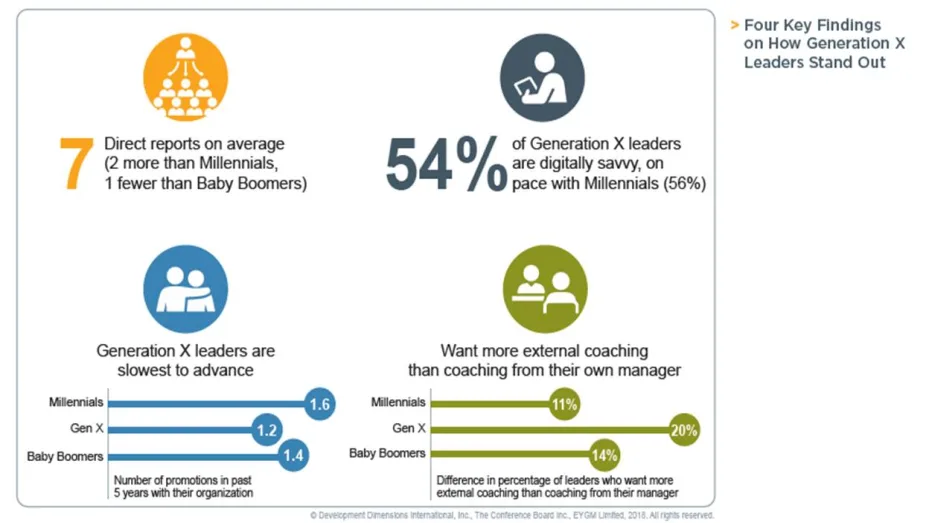The generation that has grown up playing video games, spends the most time buying online, and utilizes social media more often than any other is swiftly assuming the bulk of company leadership jobs.
If you guessed millennials, it’s because they’ve been the center of attention in the media for the past decade. However, under our definition, Generation X encompasses people born between 1965 and 1981.
In a 2014 survey, Pew Research referred to Gen X as “America’s neglected “middle child,” and we don’t hear much about the generation. All eyes appear to be on the aging baby boomers or the ascending millennials, who are now the world’s majority generation. However, as firms cope with digital change, our latest study shows that Gen X is playing a key — and unappreciated — role in leadership.
We looked at more than 25,000 executives from 54 countries and 26 main industrial sectors for our Global Leadership Forecast 2018, which was produced by DDI, The Conference Board, and EY with sponsorship from CNBC. We discovered that Gen X currently holds 51% of global leadership positions. With an average of 20 years in the business, they are well-prepared to take on practically any top executive position.
Although they aren’t considered digital natives to the same extent as millennials, our study found that Gen X executives are just as comfortable using technology in the workplace: Digital savvy is indicated by 54 percent of Gen Xers and 56 percent of millennials.
That conclusion is supported by Nielsen research, which found that Generation X is the most connected generation. According to Nielsen, Gen Xers spend 40 minutes more each week on social media than millennials. They were also more likely than millennials to stay on their phones over meals and spend more time on all types of devices, including phones, computers, and tablets. Gen X, it turns out, is taking this connectedness to the workplace.

While Gen Xers are just as adept as millennials when it comes to digital duties, they also demonstrate a mastery of traditional leadership qualities comparable to those of the baby boomer age. This involves finding and nurturing fresh talent inside their businesses, as well as overseeing the implementation of business strategies to bring innovative ideas to fruition.
Sixty-seven percent of Gen X executives excel at “hyper-collaboration” and are tireless in their efforts to break through organizational silos. The ability of Gen X leaders to work with and through others is allowing them to create the future of work and produce quicker innovation by bringing people together to solve problems for consumers and their organizations.
Despite their rising power and responsibilities at work, Gen Xers are the least likely to get promoted and have advanced the slowest. During the same time span, Gen X leaders received just 1.2 promotions on average, much less than their younger millennial colleagues (1.6 promotions) and more senior baby boomer counterparts (1.4 promotions).
While Gen X leaders are sometimes underappreciated for the important role they play in leadership, they are frequently asked to shoulder enormous responsibilities. Gen X executives, on average, have seven direct reports, compared to only five for millennials. Despite the fact that their progress rate is slower and their teams are larger, Gen X employees stay loyal. Only 37% plan to leave to further their professions, which is five percentage points lower than millennials.
Gen X is creating very skilled leaders who are in risk of being missed because they demonstrate devotion, a willingness to take on a tremendous workload, and a potent blend of digital and conventional leadership abilities. Organizations that wish to keep and grow Gen X leaders should do the following:
- Provide additional external counsel to leaders. While Gen X leaders are loyal, they seek advice and information from mentors outside their company. In fact, 67 percent of executives indicated they wanted more external mentoring and 57 percent said they wanted more external growth. Employers should invest in assisting Gen X leaders in joining professional organizations, industry conferences, and other groups so that they may develop ties with external peers and mentors who can give coaching.
- Inspire leaders to question the status quo. Many firms, particularly those that are tech-based, may look to millennials to spearhead creative projects. When given the opportunity to try new techniques and question old ways, Gen X leaders are likely to succeed. In an ideal world, a multigenerational team managed by a Gen Xer would produce the most inventive ideas.
- Make use of technology to aid traditional development. Traditional learning approaches, including as formal workshops, training courses, and seminars, are still important to Gen X leaders, as they are to earlier generations. They do, however, appreciate the personalization and convenience that technology-based solutions provide. They will be able to maximize their growth prospects by combining conventional learning techniques with tech-enabled tools to improve and solidify learning.
The oldest Gen X employees will most likely stay in the workforce for at least 10 years, while the younger members of the generation may work for more than 30, implying that Gen X will continue to constitute the backbone of organizational leadership for a long time. Those that ignore Generation X in favor of focusing solely on the youngest generations entering the workforce are missing out on a significant and important source of leadership potential.
Now is the time to focus on Gen X’s talents and continue improving their diverse set of abilities.









